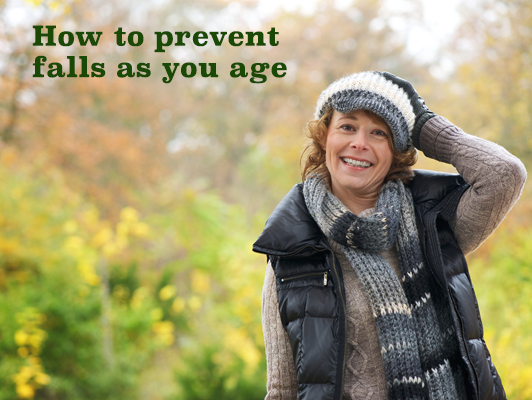Fall Prevention: How to prevent falls as you age
Did you know that each year, one out of every three adults who are older than age 65 has a fall? Most of these falls occur at home. Falls are one of the leading causes of injury among older adults. As you age, your body goes through physical changes that can lead to falls, but it doesn’t have to be a constant worry. Here are a few simple fall prevention strategies to protect yourself from falls.
- Keep active. Physical activity can help improve or maintain your balance and strength. Both of these can help you prevent falls. Physical activity does not need to be strenuous to have benefits, and it has been shown to be safe for most people at any age.
- Light it up. Keeping your home brightly lit can help prevent falls, especially in the evening as the house gets darker. Suggestions include nightlights, lamps, flashlights, and overhead or motion-sensor lights.
- Stick with slip-free shoes. When you purchase shoes and slippers, always look for non-slip options. Also make sure you get a proper fit: a shoe that is too big or loose can lead to slips and falls. Finally, avoid walking on slick surfaces in socks.
- Practice hazard control. Did you know that many common household objects and furnishings can cause falls? Clear out the hazardous objects in your house. Move cords and objects away from walkways, secure rugs with slip-resistant backing, clean spills, keep objects in arm’s reach, repair loose flooring, and use nonslip mats in the bathroom and shower.
- Add assistive devices. We all need a little help in various areas as we age, and it’s not anything to be ashamed of. Assistance can come from a variety of places, like handrails on your stairways, a toilet seat with armrests, bars in the bathtub, or a seat in the shower. Your doctor may also recommend using a cane or walker to help keep your balance.
- Drink up. Dehydration can cause a person to feel dizzy and lose balance. Aim to drink at least eight glasses of water per day, if not more in hot and humid conditions.
- Talk to your doctor. It’s always important to talk to your doctor about the medications you are using, because some may affect your balance. Also talk to him or her about your fall history and risk of falling due to current medical conditions.
It’s important to have a plan in case you do fall. If you live at home, consider wearing an alarm device to notify friends or family when you need help. Also consider carrying a cordless phone throughout the house for easy access. If you do experience a fall, seek medical attention right away.
Still want more info? Try this checklist from the CDC to learn more about how to prevent falls in your home.




